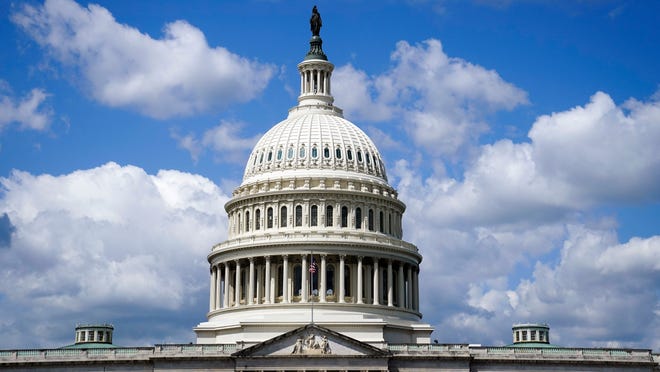
Two members of the U.S. House of Representatives on Wednesday introduced a bill that would give the NCAA, conferences and universities the protection they have sought from lawsuits as part of a bill aimed at establishing athlete compensation and other federal rules for college sports. It is important.
The move by Rep. Russell Frey (R.C.) and Rep. Barry Moore (R-Ala.) resolves a series of lawsuits against the NCAA and major conferences seeking billions of dollars in funding. This is based on continuous efforts to achieve this goal. Claim damages and challenge the association's remaining rules regarding athlete compensation. ESPN and Yahoo! Sports reported on the settlement talks last week.
Frye and Moore, both members of the House Judiciary Committee, said in a news release that their bill “ensures student-athletes' right to compensation and establishes a national framework that sets federal standards. It is intended to accompany the law.” Guardrails are installed. ”
But so far, the only broad bill introduced in Congress is one introduced last July by Alabama Sen. Tommy Tuberville and Republican Sen. Joe Manchin. Va. That bill has not received attention. The draft bill was drafted by Sens. Ted Cruz (R-Texas), Cory Booker (D.N.J.), Richard Blumenthal (D-Conn.), and Jerry Moran (R-Conn.). , Kansas) and by Representative Gus Bilirakis (R-Florida). Mr. Cruz, Mr. Booker, Mr. Blumenthal and Mr. Moran are trying to negotiate a compromise. Cruz is also calling for legal protections to be provided to the NCAA, conferences and schools.
So the bill introduced Wednesday likely passes as an effort by some members of the Republican-controlled House to take a stand on broad antitrust protections for the NCAA and its conferences and schools. It will be done. Democrats in the House and Senate have so far shown little interest in providing such aid.
The bill introduced Wednesday would protect the NCAA, conferences, and schools from being sued for:
▶ “Adopt, agree to, enforce, or comply with any rules or bylaws of any “association, conference, or school” that restrict or prohibit student-athletes from receiving compensation from the association, conference, school, or other person or entity.
▶ “Restrictions” [playing] Eligibility for student-athletes who violate school, academic, or association “rules.”
▶ “Compliance with any agreement, understanding, rule or bylaw” adopted by a school, conference, association (or combination of conferences or associations) that is reasonably considered under federal law.
In February, NCAA President Charlie Baker told a small group of reporters in Washington that there was a need for a “very limited” form of legal protection. Other college sports officials say they need to stop exposing unions and schools to lawsuits over not just player compensation, but transfer rules and whether schools can suspend players for violating school laws. It has been repeatedly discussed. /or athletic department policies.
Some of these lawsuits are stacked against each other. For example, one of the pending lawsuits the NCAA is attempting to settle seeks damages it claims are owed to athletes as a result of the Allston case decided by the Supreme Court.
Additionally, various state laws currently exist regarding athletes' ability to use their name, image, and likeness (NIL) to generate income through activities such as sponsorship deals, public appearances, surgical camps, and signing autographs. is determined. About three weeks ago, Virginia Governor Glenn Youngkin (Republican) signed a bill that will allow colleges in the state to pay NIL fees directly from their schools starting July 1st.
“NIL rules are constantly changing, subject to extensive litigation, and are essentially unenforceable, creating confusion and confusion for all involved,” Fry said in a statement. Ta. “We must establish a shield of liability at the national level to protect our schools, student-athletes, and academic societies as we navigate this new situation. This legislation is designed to save college sports as we know it. It is an essential element.”
In February, Baker said of the possibility of antitrust exemptions: I don't think there is a need for something like the wide-ranging exemption from antitrust laws that is being talked about in the public. I'm looking for something to end the uncertainty and confusion around the very basic rulemaking that is part of all of this. ”


